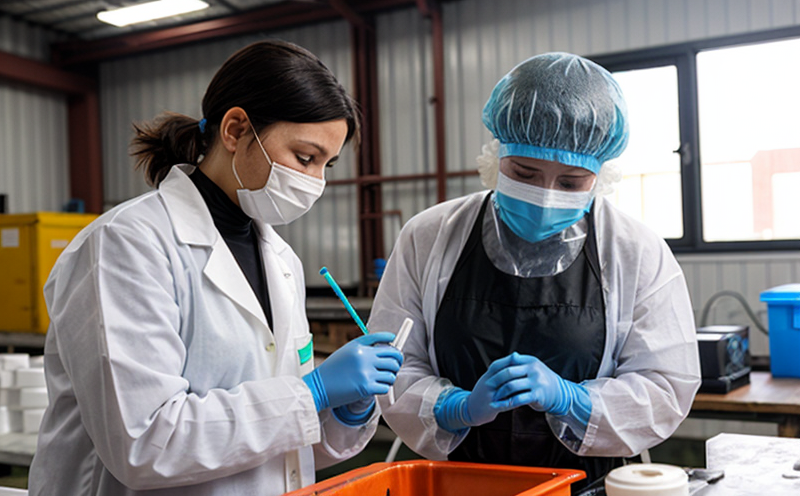DIN EN 12457 Leaching Behavior of Recycled Nanoparticle Containing Waste
The DIN EN 12457 standard is a critical tool for the evaluation of recycled nanoparticle-containing waste. This European Norm (EN) ensures that the leaching behavior of these materials does not pose a risk to the environment or human health during disposal or recycling processes.
Recycled nanoparticle-containing waste encompasses a wide range of materials, including but not limited to, those recovered from electronic devices, batteries, and various industrial by-products. The primary focus is on ensuring that these recycled nanoparticles do not leach into the environment in harmful concentrations when subjected to environmental conditions such as rainwater or groundwater.
The standard outlines a series of tests designed to simulate real-world scenarios where waste containing nanoparticles might come into contact with water, soil, and air. By adhering to these standardized procedures, laboratories can provide accurate and reliable data that is internationally recognized, ensuring the safe handling and disposal of such materials.
To perform this test, specimens are prepared by extracting particles from the waste matrix and then subjecting them to a series of leaching tests under controlled conditions. The results of these tests help determine whether the recycled nanoparticles pose any risks when they enter the environment.
The DIN EN 12457 standard is essential for industries dealing with e-waste, batteries, and other materials containing nanoparticles. It provides a framework for testing that ensures compliance with environmental regulations across different jurisdictions in Europe and internationally.
By using this standard, laboratories can offer comprehensive testing services to their clients, ensuring that the recycled nanoparticle-containing waste is safe for reuse or disposal. This not only helps maintain environmental standards but also supports sustainable practices within industries.
Why It Matters
The leaching behavior of recycled nanoparticles can have significant implications for both the environment and public health. When nanoparticles are released into the environment, they may accumulate in soil or water bodies, potentially causing harm to ecosystems and human populations.
- Environmental Impact: Nanoparticles that enter waterways can affect aquatic life, leading to disruptions in food chains and habitat destruction.
- Health Risks: Inhalation or ingestion of nanoparticles can pose health risks if they are not properly contained during recycling processes.
The DIN EN 12457 standard helps mitigate these risks by providing a standardized approach to testing. This ensures that recycled materials meet stringent environmental and safety standards, promoting responsible waste management practices.
For industries involved in the recycling of e-waste or batteries, compliance with this standard is crucial for maintaining a sustainable supply chain. It also enhances consumer trust and regulatory compliance, which are vital factors in today's market.
Quality and Reliability Assurance
- Standardized Procedures: The DIN EN 12457 standard provides clear guidelines for specimen preparation, leaching tests, and data analysis. This ensures that the testing process is consistent across different laboratories.
- Consistency in Results: By adhering to this standard, laboratories can achieve reliable and reproducible results, which are essential for making informed decisions about the safety of recycled nanoparticles.
The reliability of test results is further enhanced by using high-quality equipment and trained personnel. This ensures that the testing process is as accurate as possible, leading to more trustworthy data.
International Acceptance and Recognition
- Broad Application: DIN EN 12457 is widely recognized across Europe and internationally. Its acceptance ensures that the test results are valid in multiple jurisdictions, simplifying compliance processes for multinational companies.
- Regulatory Compliance: By adhering to this standard, businesses can ensure they meet regulatory requirements set by various countries and international bodies.
The standard's widespread adoption underscores its importance in the global context of environmental protection and sustainable development. Its recognition by key regulatory bodies further emphasizes its role in promoting responsible waste management practices.





